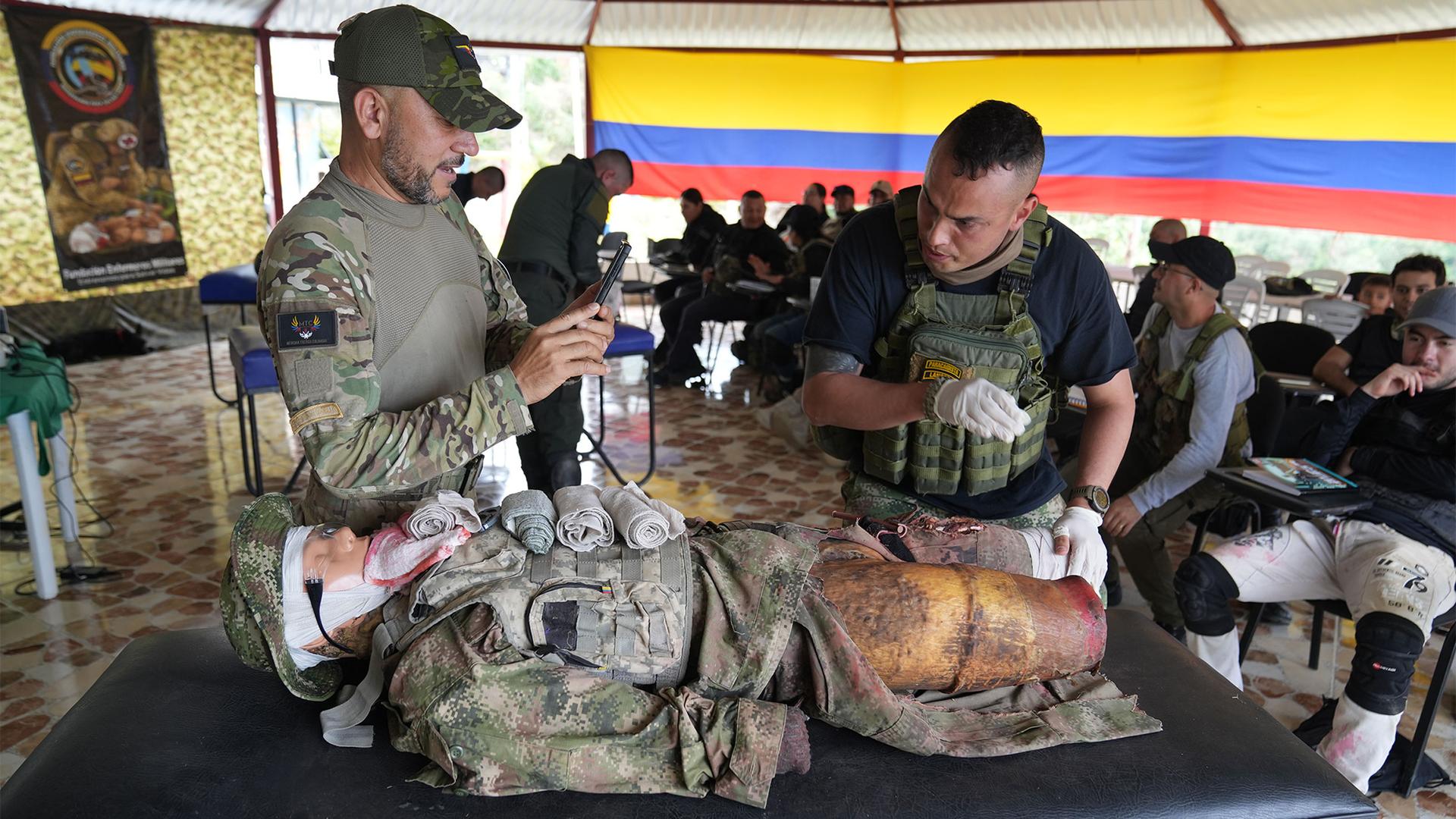As a soldier in Colombia, Caleb became used to making long treks across the rainforest, and fighting gun battles against rebel groups.
Now he fights for Ukraine’s army, shooting at enemies from freezing trenches in flat fields, where he must evade fire from Russian tanks and attacks from kamikaze drones.
For security reasons, Caleb asked to be identified only by his military nickname.
“I’m sorry if this offends anyone,” he said in a video call from a base in the Donetsk region. “But Colombia’s conflict is child’s play compared to this war.”
Hundreds of Colombians have enlisted in Ukraine’s military recently, as it tries to replenish its forces following months of heavy losses on the frontlines.
Many of the Colombian fighters who have joined the war are veterans who have struggled to adapt to civilian life. Some see the conflict in Ukraine as an opportunity to make decent money. For others, it’s a way to return to military life.

Caleb said he served in Colombia’s army for two decades as a professional soldier, specializing in artillery. During his last year in the military, he was retrained as a refrigerator technician.
But he struggled to find work in his new occupation. He also tried his hand at gold mining in his native province of Norte de Santander, but couldn’t acquire the permits to set up his own business because he didn’t have the funds.
Caleb said that the lack of employment opportunities in Colombia eventually lured him to Ukraine’s trenches. In September, he enlisted in Ukraine’s army, at the age of 45.
“I love this country because, despite my age, they gave me work,” he said. “Now, I am doing what I like to do and what I’ve trained for all my life.”
Colombian veterans have been joining military contractors and foreign armies since the early 2000s, as they search for work opportunities following retirement from their own military.

Veterans from the South American nation have protected oil wells in Iraq for US contractors and even served as military trainers in the United Arab Emirates.
Decades of internal conflict has forced Colombia to field a large army of about 255,000 troops — from which about 10,000 soldiers retire every year.

Many have combat experience from the nation’s battles with rebel groups, and they have been trained in a variety of specialties that include counterinsurgency warfare, landmine removal and tactical medicine.
A ‘popular destination’ for veterans
Now, Ukraine has become a popular destination for Colombian veterans, said Raul Musse, the president of Colombia’s Association of Retired Soldiers.
He said that, in Colombia, soldiers retiring with low ranks, such as a private or a sergeant, earn pensions that go from $300 to $600 a month. But many have acquired debts, or need more money to sustain their families. So, they are heading to Ukraine, where soldiers serving on the frontlines are getting paid about $3,000 a month.
“Most of them are going out of economic need,” Musse said at the association’s office in Bogotá.

“But there are also some who have told me that they feel frustrated at home and don’t know what else to do. And they are looking for ways to return to military life.”
Ukraine has not said how many foreigners are serving in its military. But it has made it easier for Colombians and other Latin Americans to join its foreign legion recently, by setting up a recruitment site in Spanish.
Ukraine’s military has also eased language requirements. In November, it announced that soldiers who only speak Spanish can also join the foreign legion.
“It’s a new way in which states are dealing with armed conflict,” said Andres Macias, a professor at Bogotá’s Externado University, who has researched the role of Colombian mercenaries in international conflicts.
War as opportunity
Macias said that previously, armies hired foreigners and military contractors in support roles like surveillance, security for infrastructure or training. But now, some countries are integrating foreigners directly into their ranks and giving them positions on the battlefield.
“If you don’t have enough military, you have to seek a way to strengthen your forces,” Macias said.
Ukraine’s efforts to recruit Latin American soldiers come as its struggles to get more of its own people to serve on the frontlines.
The nation’s parliament is currently debating a law that would expand the local pool of conscripts by lowering the minimum age for mobilization, from 27 to 25.
The bill also proposes freezing the bank accounts of people who avoid the draft.
While some Ukrainians appear to be reluctant to go to the frontlines, there are young men in Colombia who see the war as an opportunity.

Herney Peña served in Colombia’s army for two years, and now runs a small coffee farm where he makes around $300 a month.
He registered in Ukraine’s foreign legion in January, and is planning to travel there next month.
“The situation in Colombia is very tough,” Peña said. “If I stay here I’ll never have financial freedom.”
If he survives the war, Peña, 30, plans to use his savings to start a small business. He said he would like to set up a bar or a motorbike repair shop.
“I know there are risks,” he said. “But I want to make the most out of my life. I don’t want to reach old age like my father and my brother, and still have to hack at coffee bushes to make ends meet.”
Related: Body armor factories in the Americas are sending gear to war-torn Ukraine
We want to hear your feedback so we can keep improving our website, theworld.org. Please fill out this quick survey and let us know your thoughts (your answers will be anonymous). Thanks for your time!
